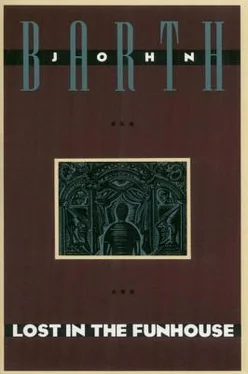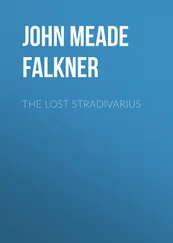John Barth - Lost in the Funhouse
Здесь есть возможность читать онлайн «John Barth - Lost in the Funhouse» весь текст электронной книги совершенно бесплатно (целиком полную версию без сокращений). В некоторых случаях можно слушать аудио, скачать через торрент в формате fb2 и присутствует краткое содержание. Год выпуска: 2014, ISBN: 2014, Издательство: Knopf Doubleday Publishing Group, Жанр: Современная проза, на английском языке. Описание произведения, (предисловие) а так же отзывы посетителей доступны на портале библиотеки ЛибКат.
- Название:Lost in the Funhouse
- Автор:
- Издательство:Knopf Doubleday Publishing Group
- Жанр:
- Год:2014
- ISBN:978-0-8041-5250-1
- Рейтинг книги:3 / 5. Голосов: 1
-
Избранное:Добавить в избранное
- Отзывы:
-
Ваша оценка:
- 60
- 1
- 2
- 3
- 4
- 5
Lost in the Funhouse: краткое содержание, описание и аннотация
Предлагаем к чтению аннотацию, описание, краткое содержание или предисловие (зависит от того, что написал сам автор книги «Lost in the Funhouse»). Если вы не нашли необходимую информацию о книге — напишите в комментариях, мы постараемся отыскать её.
Lost in the Funhouse — читать онлайн бесплатно полную книгу (весь текст) целиком
Ниже представлен текст книги, разбитый по страницам. Система сохранения места последней прочитанной страницы, позволяет с удобством читать онлайн бесплатно книгу «Lost in the Funhouse», без необходимости каждый раз заново искать на чём Вы остановились. Поставьте закладку, и сможете в любой момент перейти на страницу, на которой закончили чтение.
Интервал:
Закладка:
All very well, you may say: lamentable as our situation is, it’s nothing new; we were born this way and have somehow muddled through thirty-five years; not even a king has his own way in everything; in the matter of congenital endowment it’s potluck for all of us, we must grin and bear it, the weakest to the wall, et cetera. God knows I am no whiner; I’ve broken heart and spirit to make the best of a bad hand of cards; at the slimmest hint of sympathy from my brother, the least suggestion of real fraternity, I melt with gratitude, must clamber aboard lest I swoon of joy; my tears run in his hair and down the courses of his face, one would think it was he who wept. And were it simply a matter of accumulated misery, or the mere happenstance of your visit, I’d not burden you (and my own sensibility) with this complaint. What prompts my plea is the coincidence of your arrival and a critical turn in our history and situation.
I pass over the details of our past, a tiresome chronicle. Some say our mother died a-bearing us, others that she perished of dismay soon after; just as possibly, she merely put us out. The man we called Father exhibited us throughout our childhood, but the age was more hardened to monstrosity than Chang’s and Eng’s; we never prospered; indeed we were scarcely noticed. In earliest babyhood I didn’t realize I was two; it was the intractability of that creature always before me — going left when I would go right, bawling for food when I would sleep, laughing when I wept — that opened my eyes to the possibility he was other than myself; the teasing of playmates, who mocked our contretemps, verified that suspicion, and I began my painful schooling in detachment. Early on I proposed to my brother a judicious alliance (with myself, naturally, as director of our activities and final arbiter of our differences, he being utterly a creature of impulse); he would none of my proposal. Through childhood our antipathies merely smoldered, as we both submitted perforce, however grudgingly, to Father (who at least never denied our twoness, which, to be sure, was his livelihood); it was upon our fleeing his government, in adolescence, that they flamed. My attempt to direct our partnership ended in my brother’s denying first my efficacy, then my authority, finally my reality. He pretended to believe, offstage as well as on, that the audience’s interest was in him as a solo performer and not in the pair of us as a freak; hidden from the general view, unable to speak except in whispers, I could take only feeblest revenge: I would wave now and then between the lines of his stupid performances, grimace behind his back and over his shoulder, make signs to mock or contradict his asseverations. Let him deny me, he couldn’t ignore me; I tripped him up, confused, confounded him, and though in the end he usually prevailed, I pulled against him every step of his way, spoiled his pleasure, halved his force, and on more than one occasion stalled him entirely.
The consequent fiascos, the rages and rampages of his desperation, are too dreadful to recount; them too I pass over, with a shudder. For some time now our connection has been an exasperated truce punctuated with bitter bursts of hostility, as between old mismatched spouses or weary combatants; the open confrontations are less frequent because more vicious, the interim resentments more deep because more resigned. Each new set-to, legatee of all its predecessors, is more destructive than the last; at the merest popgun-pop, artillery bristles. However radically, therefore, our opposition restricts our freedom, we each had come to feel, I believe, that the next real violence between us would be the last, fatal to one and thus to both, and so were more or less resigned to languishing, disgruntled, in our impasse, for want of alternatives. Then between us came Thalia, love, the present crisis.
It will scarcely surprise you that we arrived late at sexuality. Ordinary girls fled from our advances, or cruelly mocked us; had our bookings not fetched us to the capitals of Europe, whose liberal ladies sought us out for novelty’s sake, we’d kept our chastity perforce till affluent maturity, for common prostitutes raised their fees, at sight of us, beyond our adolescent means. Even so, it was my brother did all the clipping, I being out of reach except to surrogate gratifications; only when a producer of unusual motion pictures in Berlin, with the resourcefulness characteristic of his nation, discovered Thalia and brought her to us, did I know directly the experience of coition. I did not enjoy it.
More accurately, I was rent by emotions as at odds as I and my brother. Thalia — a pretty young contortionist of good family obliged by the misery of the times to prostitute her art in exotic nightclubs and films — I admired tremendously, not alone for her merry temper and the talent wherewith she achieved our connection, but for her silent forbearance, not unlike my own, in the face as it were of my brother’s abuse. But how expect me to share the universal itch to copulate, whose soul lusts only for disjunction? Even our modest coupling (chaste beside his performances), rousing as it was to tickly sense, went so counter to my principles I’d hardly have enjoyed it even had my brother not indignified her the while. Not content to be double already, he must attach himself to everyone, everything; hug, devour, absorb! Heads or tails, it’s all one to Brother; he clamped his shaggy thighs about the poor girl’s ears as greedily as he engorges a pot roast or smothers me into the mattress, threatening with a laugh to squash and ingest me.
After a series of such meetings (the film director, whether as artist or as Teuton, was a perfectionist) we discovered ourselves in love: I with Thalia, my brother likewise in his fashion, and laughing Thalia … with me, with me, I’m sure of it! At least in the eginning. She joined our act, inspired or composed fresh material for us; we played with profit the naughty stages of a dozen nations, my brother still pretending he had no brother despite our billing: The Eternal Triangle. Arranged in parallel, isosceles, or alphaic fashion, we slept in the same hotel beds, and while it was he who salivated and grunted upon her night after night, as he does yet, still it pleased me to imagine that Thalia permitted him her supple favors out of love for me, and humored his pretense that I did not exist in order to be with me. By gay example she taught me to make fun of our predicament, chuckle through the teeth of anguish, turn woe into wit. In the heights of his barbarous passion our eyes meet, and I have seen her wink; as he roars in his transports, her chin rests on his shoulder; she grins, and I chastely kiss her brow. More than once I have been moved to put my love into written words, to no avail; what profit to be articulate, when he seizes every message like a jealous censor and either obscures its tender sentiments past deciphering or translates them into his own coarse idiom? I reach to comfort her; he thrusts my hand into her crotch; she takes it for his and pretends delight. Agile creature that she is, she would enfold us both in her honey limbs, so to touch the one she loves; as if aware, he thwarts her into some yoga position, Bandha Padmāsana, Dhanurāsana. Little wonder our love remains tentative with him between us, who for aught I know may garble even this petition; little wonder we doubt and mistake each other. Indeed, I can only forgive her, however broken-heartedly, if the worst of my suspicions should prove true: that, hardened by despair, Thalia is becoming her disguise: the vulgar creature who ignores my signals, denies my presence, growls with feral joy beneath her ravisher! My laughter sticks in my throat; either Thalia has lost her sense of humor or I’ve lost mine. Mirth passes; our wretchedness endures and brutalizes. Truth to tell, she has become a stranger; with the best will in the world I can’t always persuade my heart that her refusal to acknowledge me is but a stratagem of love, her teasing and fondling of the man I abhor mere feminine duplicity, to inspire my ardor and cover our tracks. What tracks, Thalia? Of late, particularly, she behaves on occasion as if I stood in the way of her contentment, and in darkest moments I can even wonder whether her demand that my brother “pull himself together” is owing to her secret desire for me or a secret wish to see me gone.
Читать дальшеИнтервал:
Закладка:
Похожие книги на «Lost in the Funhouse»
Представляем Вашему вниманию похожие книги на «Lost in the Funhouse» списком для выбора. Мы отобрали схожую по названию и смыслу литературу в надежде предоставить читателям больше вариантов отыскать новые, интересные, ещё непрочитанные произведения.
Обсуждение, отзывы о книге «Lost in the Funhouse» и просто собственные мнения читателей. Оставьте ваши комментарии, напишите, что Вы думаете о произведении, его смысле или главных героях. Укажите что конкретно понравилось, а что нет, и почему Вы так считаете.












